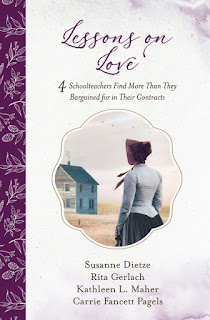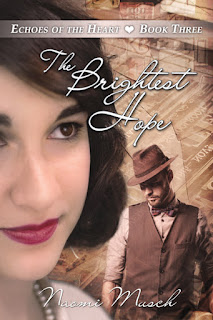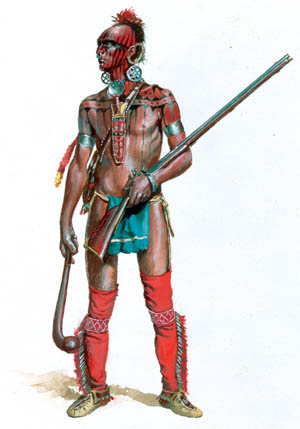Welcome to our Colonial Quills Autumn Tea Party for our authors' new releases!!! Come on in and take a place by the fire as we serve you tea and treats!
Carrie Fancett Pagels:
 |
| Mercy in a Red Cloak audiobook |

I'm delighted that my colonial-era suspenseful romance is available in paperback, ebook, and now audiobook! Set during the time of Pontiac's War, after the French-Indian War, it took me about seven years to finally have this story released. The audiobook narrator is Bill Anciaux, at fine narrator and he brought Shadrach Clark's and Mercy Clarke's story to life.
Storyline: Famed colonial scout, Shadrach Clark, is sought out in the Straits of Mackinac, when he has gone missing. His dear friend, Mercy, whose circuit-rider father is also missing, joins in the search. Set during the time of Pontiac's War, can love still blossom?
GIVEAWAY: An autographed paperback copy!
Four lovely stories in this collection from Barbour Publishing. I was delighted to write another Mackinac Island-set story. This novella begins right before my Maggie Award winning story My Heart Belongs on Mackinac Island. I had so much fun writing this story because I got to hang out with some of my favorite characters again, such as little Jack Welling.
In Desperate Straits by Carrie Fancett Pagels
Mackinac Island, Michigan, 1894
Desperate for work, Margaret Hadley dresses as a young man to secure a dray driver’s position. When soldiers at the fort threaten her, Mackinac Island’s newest teacher, Jesse Huntington, intervenes.
Denise Weimer:
Today I'm celebrating the release of The Witness Tree, my historical romance set in 1805 Cherokee Territory.
Past betrayal has turned John Kliest’s passion to his work as a builder and surveyor in the Moravian town of Salem, North Carolina. Now, to satisfy the elders’ edict and fulfill his mission in Cherokee Territory, he needs a bride. But the one woman qualified to record the Cherokee language longs for a future with his younger brother.
Clarissa Vogler’s dream of a life with Daniel Kliest is shattered when she is chosen by lot to marry his older brother and venture into the uncharted frontier. Can she learn to love this stoic man who is now her husband? Her survival hinges on being able to trust him—but they both harbor secrets.
The Witness Tree on Amazon
I'll be sharing more about the Moravians and Cherokees during my 5:30 time slot on the Facebook party, when I'll also be giving away e-book copies of both The Witness Tree and my new contemporary romance, Fall Flip (Fall Flip on Amazon), plus a Moravian-themed goody pack. If you'd like to win a PRINT copy of The Witness Tree, leave a comment here on our blog (U.S.).
Janet Grunst here. Thanks for joining us for our fall release party.
I’m privileged to be a part of THE HIGHLANDERS, the second Smitten Historical Romance Collection that releases November 15th. While the four stories are all about men from the Scottish Highlands, two are set in America and two are set during the Colonial period. They are all quite different from each other. My story The Year Without Summer takes place in 1816 in the Scottish Highlands and Northern Ireland. At the party, I'll share some fun details about the book's cover and more about the stories.
I will be giving away a signed copy of The Highlanders to one USA commenter on the blog. Enjoy the party.
Naomi Musch
Naomi Musch

Hi
there, Colonial Quills Readers! Everyone finished brewing their tea yet? I’ll
just stir a dollop of honey into my cup while I tell you about my upcoming
release, also in THE
HIGHLANDERS collection, available for pre-order and going live on November
15th.
In
this novella collection spanning two centuries and featuring Highlander heroes,
my story A TENDER SIEGE is about grieving widow Lachlan McRea of his Majesty’s
42 Highlanders wounded during Pontiac’s War in the Battle of Bushy Run. Begging
God to take him, and longing only to see his lost wife and child again, Lachlan
is discovered by Wenonah, an Odawa widow living on her own precarious edge of
safety and need. In aiding one another, Lachlan and Wenonah’s perils increase,
but if he can let go of the woman he once loved, he might yet find healing for
both body and soul.
The
Highlanders Collection is four novellas spanning two centuries, with four
distinct authors’ voices, settings, and story styles. Pre-order is available,
and by signing up for my newsletter, you
can get a sneak peek at the complete first chapter of A TENDER SIEGE.
~~~
Another
recent release of mine isn’t Colonial, but I hope you’ll take a peek. THE
BRIGHTEST HOPE concludes my Echoes of the Heart WWI and post war series.
Holly
Allen is a well-adjusted war widow who’s developed a knack for running the
family press. Her world is turned upside down when she hires “front man” Hugh
Phelps to give customers the man-in-charge image they want. With the ghosts of
his past, Hugh is anything but a white knight riding in to sweep her away from
her cares. Yet when new beginnings finally do seem possible, old heartaches from
the war come calling. Now it might only be in letting go of everything dear
that they both discover what real love is.
Want
to enter to win a signed, full paperback set of the series? Copy and Share the
image below on social media and tag me in the post, and I’ll add your name to
the drawing. (If it’s easier, you can go to my FB author page or Twitter profile page and share it from
there.)
 |
| https://amazon.com/author/naomimusch |
Angela Couch
Nothing like a tea party to warm spirits. Not that there was much time for tea or parties in the middle of the war for American freedom. After three years, my Hearts at War series is complete:
It started deep in the Mohawk Valley with the Battle of Oriskany, where Rachel Garnet looses her father and stumbles upon (quite literally) a wounded British captain. They don't expect him to last the night, but when he starts to recover, how will they keep his presence a secret?
Jane Austen's Sense and Sensibility meets the wilderness of Colonial America.
Book two took us south with Daniel Reid. After three years service in the Colonial Army, and he's still not ready to go home to the Mohawk Valley. He takes a message to the legendary Swamp Fox, and finds himself in a tangle of spies and intrigue, where he can't be certain who he can trust.
Book four brought us home. Burying his wife is the hardest thing Joseph Garnet has done, until he's called to leave his young son and baby daughter to fight Iroquois raiders. When one of the marauders tries to steal his horse, the last thing he expects is to end up tussling with a female. The girl is wounded, leaving Joseph little choice but to haul her home to heal—an act that seems all too familiar.
And finally, it all comes together.
It started deep in the Mohawk Valley with the Battle of Oriskany, where Rachel Garnet looses her father and stumbles upon (quite literally) a wounded British captain. They don't expect him to last the night, but when he starts to recover, how will they keep his presence a secret?
Jane Austen's Sense and Sensibility meets the wilderness of Colonial America.
Book two took us south with Daniel Reid. After three years service in the Colonial Army, and he's still not ready to go home to the Mohawk Valley. He takes a message to the legendary Swamp Fox, and finds himself in a tangle of spies and intrigue, where he can't be certain who he can trust.
Book four brought us home. Burying his wife is the hardest thing Joseph Garnet has done, until he's called to leave his young son and baby daughter to fight Iroquois raiders. When one of the marauders tries to steal his horse, the last thing he expects is to end up tussling with a female. The girl is wounded, leaving Joseph little choice but to haul her home to heal—an act that seems all too familiar.
And finally, it all comes together.
The war for American freedom is
over, and the British have gone back to England. Not knowing what has
become of his family since he was forced into the Continental Army nine
years earlier, Myles Cunningham wants to go home as well. He returns to
the Mohawk Valley with the understanding that he is believed to have
been shot for deserting—fiction that might be made real if anyone
recognizes him as the son of a Tory and a King's Ranger.
Everything is wonderful in the growing community along the Mohawk River, except Nora Reid is still alone. With her brother happily settled and both her younger sisters starting families of their own, Nora feels the weight of her twenty-four years. A long walk leads her to the overgrown rubble of the Cunningham homestead where a bearded stranger begins to awaken feelings she'd lost hope of ever experiencing.
With secrets abounding—including whether Myles even cares for her—Nora must determine what she is ready to give up and how far she will go to secure his affections. She begins to break through his defenses, but Myles can't risk staying. Not if he loves her.
Read more and find buy links on my website: www.angelakcouch.com
Between here and the facebook party, I will be giving away an e-book of each of these stories!
Everything is wonderful in the growing community along the Mohawk River, except Nora Reid is still alone. With her brother happily settled and both her younger sisters starting families of their own, Nora feels the weight of her twenty-four years. A long walk leads her to the overgrown rubble of the Cunningham homestead where a bearded stranger begins to awaken feelings she'd lost hope of ever experiencing.
With secrets abounding—including whether Myles even cares for her—Nora must determine what she is ready to give up and how far she will go to secure his affections. She begins to break through his defenses, but Myles can't risk staying. Not if he loves her.
Read more and find buy links on my website: www.angelakcouch.com
Between here and the facebook party, I will be giving away an e-book of each of these stories!
*~*~*~
Our Facebook Party begins at 5 pm Eastern Time tonight, October 30th, 2019.
Comment here on the blog for giveaways associated with this post and come by the Tea Party tonight for more fun and giveaways! As always, thank you so much for celebrating with us!


















